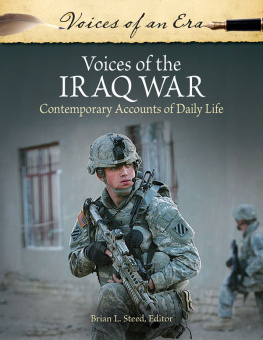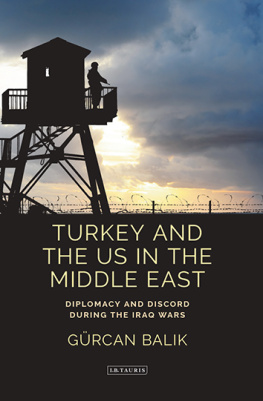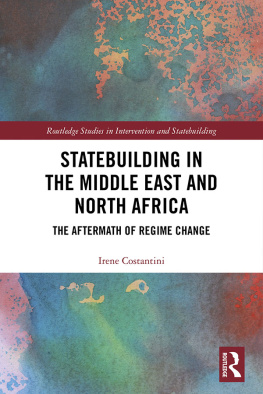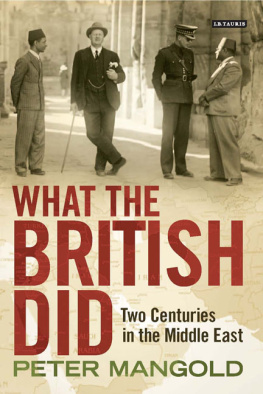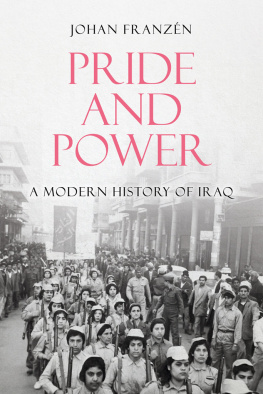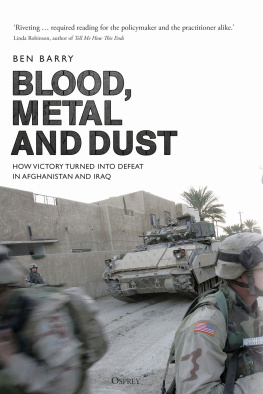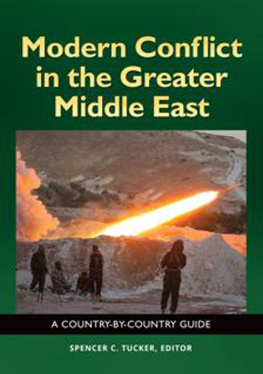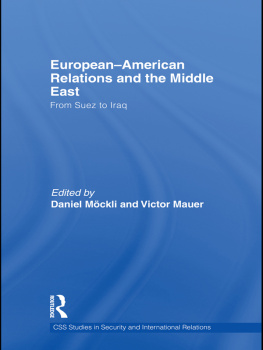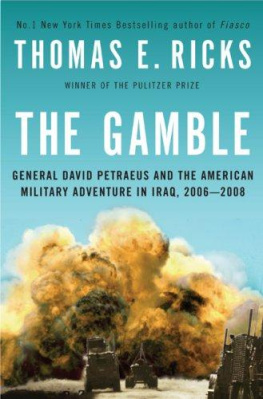Voices of the Iraq War
Recent Titles in Voices of an Era
Voices of Ancient Greece and Rome: Contemporary Accounts of Daily Life
David Matz, editor
Voices of Civil War America: Contemporary Accounts of Daily Life
Lawrence A. Kreiser, Jr. and Ray B. Browne, editors
Voices of Early Christianity: Documents from the Origins of Christianity
Kevin W. Kaatz, editor
Voices of Early Modern Japan: Contemporary Accounts of Daily Life during the Age of the Shoguns
Constantine Vaporis, editor
Voices of Revolutionary America: Contemporary Accounts of Daily Life
Carol Sue Humphrey, editor
Voices of Shakespeares England: Contemporary Accounts of Elizabethan Daily Life
John A. Wagner, editor
Voices of Victorian England: Contemporary Accounts of Daily Life
John A. Wagner, editor
Voices of World War II: Contemporary Accounts of Daily Life
Priscilla Mary Roberts, editor
Voices of Ancient Egypt: Contemporary Accounts of Daily Life
Rosalie David, editor
Voices of the Reformation: Contemporary Accounts of Daily Life
John A. Wagner, editor
Voices of the Iraq War
Contemporary Accounts of Daily Life
Brian L. Steed, Editor
Voices of an Era

Copyright 2016 by ABC-CLIO, LLC
All rights reserved. No part of this publication may be reproduced, stored in a retrieval system, or transmitted, in any form or by any means, electronic, mechanical, photocopying, recording, or otherwise, except for the inclusion of brief quotations in a review, without prior permission in writing from the publisher.
Library of Congress Cataloging-in-Publication Data
Names: Steed, Brian L., editor of compilation.
Title: Voices of the Iraq war : contemporary accounts of daily life / Brian L. Steed, editor.
Description: 1st edition. | Santa Barbara, CA : Greenwood, an imprint of ABC-CLIO, LLC,
[2016] | Series: Voices of an era | Includes bibliographical references and index.
Identifiers: LCCN 2015043229 | ISBN 9781440836749 (alk. paper) | ISBN 9781440836756 (ebook)
Subjects: LCSH: Iraq War, 20032011Personal narratives, American. | Iraq War, 20032011
Sources. | Iraq War, 20032011Public opinion. | Public opinionUnited States.
Classification: LCC DS79.766.A1 V68 2016 | DDC 956.7044/30922dc23
LC record available at http://lccn.loc.gov/2015043229
ISBN: 978-1-4408-3674-9
EISBN: 978-1-4408-3675-6
201918171612345
This book is also available on the World Wide Web as an eBook.
Visit www.abc-clio.com for details.
Greenwood
An Imprint of ABC-CLIO, LLC
ABC-CLIO, LLC
130 Cremona Drive, P.O. Box 1911
Santa Barbara, California 93116-1911
This book is printed on acid-free paper 
Manufactured in the United States of America
Disclaimer
All opinions and suppositions expressed in this work are entirely those of the author and in no way reflect the positions, opinions, or policies of the United States Army, the United States Department of Defense, or any official or agency of the United States government.
To the Iraqi people and the people who live in the Middle East:
I am most humbly sorry for the mess we have made.
To my wife whose assistance made this book a reality: Thank you!
Contents
Documents of the Iraq War
The Iraq War is my war. On September 11, 2001, I was an instructor in the U.S. Army Armor School at Fort Knox. My students and I rushed to help establish an emergency operations center at that installation where we planned against an expected attack targeting the bullion depository made famous in the James Bond movie Goldfinger. That attack did not materialize, but since that day my life has been consumed by the Global War on Terrorism and the Middle East region. I trained many junior armor officers who deployed to Iraq in 2003 with the first invasion forces. Some of the voices in this book come from peers and former students who sacrificed and suffered from this long war.
I was deployed to Iraq in 2005 where I worked as a desk officer in the Political-Military office of the U.S. Embassy-Baghdad annex located in the Presidential Palace of Saddam Hussein. I swam in the pool, I endured the heat and dust storms, and I experienced firsthand the complexity of Iraq and the competing demands of those who we (U.S. military) believed served the interests of the Iraqi nation. My boss worked on issues related to Sunni Iraqis working in the Iraq Ministry of Defense and I was invited to several of the meetings to understand the competing interests and confrontations within the Government of Iraq.
From 2005 to 2008 I lived in Jordan and I served as an exchange officer with the Jordanian Army. My responsibilities included visits to the frontier borders of Jordan where I regularly viewed Iraq from Jordan. I visited the Iraqi-Jordanian border crossingboth sides of itand I saw the corruption and challenges with respect to the new Iraq being created by the U.S. involvement. I was aware of all cross-border events including smuggling and violent exchanges. The invasion of Iraq had a dramatic impact on the Hashemite Kingdom of Jordan as Iraqi refugees flooded the country and challenged the humanitarian capacity of the small and poor nation. Wealthy and influential Iraqis also flooded into Amman, the capital of Jordan, where they caused real estate prices to skyrocket with their influx of money. Some of the money was U.S. dollars corruptly obtained from the U.S. government in the effort to rebuild Iraq.
I observed the effect of Iraq on U.S. military personnel as they visited Israel on official delegations while I served there from 2008 to 2010 as a liaison to the Israel Defense Forces. During one visit a sergeant needed my assistance to get him away from a crowded Arab market in the Old City of Jerusalem as he was suffering from posttraumatic stress flashbacks of previous Arab-speaking markets from his time in Baghdad. I helped him to get to a quiet place where he could reduce the anxiety. This was my first understanding of the cost of this war on otherwise healthy and capable young men and women.
In 20102011, I deployed to Iraq for a full year. I initially worked on foreign military sales cases; I was responsible for managing the details of numerous cases dealing with the M1A1 main battle tanks and associated ammunition and equipment. In this capacity I visited the Iraqi Armor School, training facilities, and range complexes. Later I changed positions to being an advisor and analyst for one of three deputy commanding generals for U.S. Forces-Iraq. This gave me a broader perspective as I attended meetings with senior government of Iraq and Iraq Ministry of Defense and Ministry of Interior officials. I also helped to prepare presentations to senior U.S. government visitors from the legislative and executive branches of government. I observed the decision-making process associated with the U.S. withdrawal from Iraq.
I left Iraq in July 2011 and I went to the United Arab Emirates where I worked in the United States Embassy-Abu Dhabi. From there I observed the perception of the U.S. actions and withdrawal from a regional perspective. I watched the declining U.S. influence in Iraq and in the region because of Iraq.
I returned to the United States after more than eight and a half years in the Middle East in 2013. I became a history instructor at the U.S. Army Command and General Staff College at Fort Leavenworth, Kansas. I taught military history and Middle East history. From this academic ivory tower I watched the fall of Mosul (2014) and the capture of Ramadi (2015). I returned to Iraq to help in the fight against the Islamic State in December 2014 for a little more than two months. I teach an elective titled What Just Happened? History of the Global War on Terrorism where I try to help U.S. military officers understand the complexities of what happened and why.

